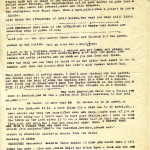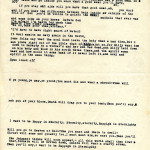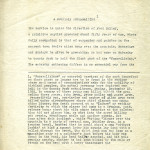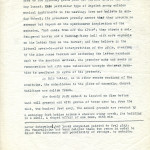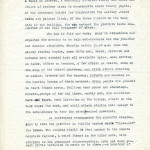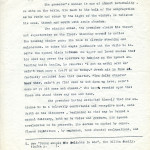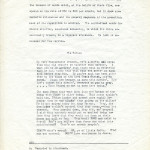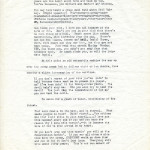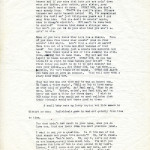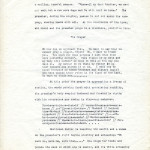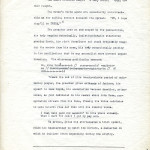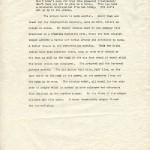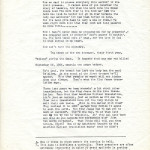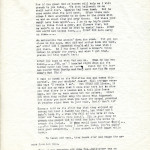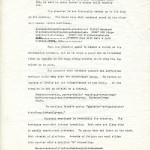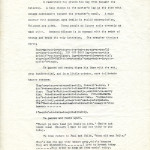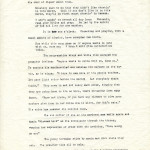Pine Mountain Settlement School
Series 34: RELIGION
A Mountain Funeralizing
Three Eyewitness Accounts
1928, c. 1930s, 1932
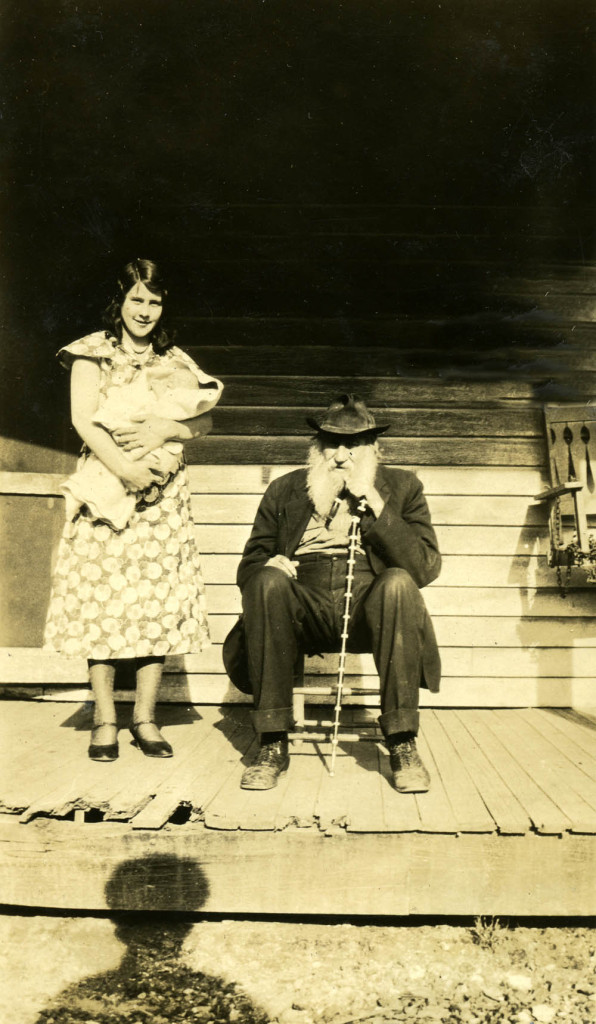
Uncle Ira Combs, preacher, seated on porch with young woman standing to his right, holding his great-grandchild. FN [Vl_35_1139.jpg]
TAGS: Funeralizing, funerals, religion, religious services, Pine Mountain Settlement School, Harlan County KY, burialx, death rituals, anti-intellectualism, Bible, preachers
RELIGION A Mountain Funeralizing
A MOUNTAIN FUNERALIZING provides images and transcriptions of three accounts, largely eyewitness, of this common mountain death ritual. The events occurred in 1928, c. 1930s, and 1932.
Typically, a mountain “funeralizing” took place well after the death of the individual, as these ceremonies were essentially memorial services. The event could be located in a graveyard or at the home of the deceased. In the 1940s there were still many “funeralizings” in eastern Kentucky. Today, these events are rare.
GRAVE HOUSES
Further, in the small cemeteries that dotted the hillsides in the Pine Mountain valley in the 1940s many traditional grave houses could also be found. These structures, typical of early cemeteries in Eastern Kentucky, are rarely encountered today. Most of the small, elaborate “houses” have melted into the earth. It is rare to encounter even remnants of these unique structures in the mountain cemeteries of today.
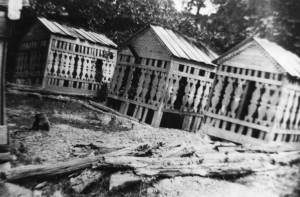
Grave Houses. These were common in the Southern Appalachians in the 1800s and early 1900s, but few have survived today. [misc_exhibit_009 copy]
CONTENTS: A Mountain Funeralizing
I. 1932 ‘FUNERALIZING’ FOR ELIZABETH GILLAM SMITH, GILLEY, KENTUCKY. On July 17, 1932, an unnamed Line Fork Settlement worker recorded the funeral of Elizabeth Gillam and of her first husband, a Mr. Smith. The Smiths were the grandparents of Jason Smith, an individual known to the author of the account. The funeralizing was to remember the death of Elizabeth some eight years previous to the funeralizing and the death of her first husband, some twenty years before the event. The long delay was not uncommon. The 1932 event at Gilley, Kentucky, near the Line Fork Medical Settlement occurred at a cemetery between the Gilley Post Office and Hilton’s Store. The scene is described,
Graves bare but on these of the subjects of the funeral were magenta and yellow paper flowers. The congregation sat on pine boards on pine logs in the sun, About 150 present, quiet and well behaved.
The obituaries were first read. Then a hymn, minor [key]. Then a prayer by Lewis Riddle.
… Sermon by Bud Colvin. Over an hour and half long.
… Sermon by Granville Riddle. [Reading from the Bible.]
II. THE FUNERAL, c. 1930s. The second ‘funeralizing’ account, THE FUNERAL, is by two Pine Mountain workers who were sent to a community funeralizing on Greasy Creek to represent the School and to gather information on the ritual. One is identified in the account.
III. A MOUNTAIN FUNERALIZING, 1928. The third account is a 15-page transcription of A MOUNTAIN FUNERALIZING that appears to have been prepared for publication and is very detailed in its representation of the ritual service.
GALLERY I: 1932 ‘Funeralizing’ for Elizabeth Gillam Smith, Gilley, Kentucky
- E. Gillam Smith & Husband Funeralizing unknow_funeral_notes_001.jpg
- E. Gillam Smith & Husband Funeralizing unknow_funeral_notes_002.jpg
TRANSCRIPTION
[Note: Minor edits have been made for readability.]
I. 1932 ‘Funeralizing’ for Elizabeth Gillam Smith, Gilley, Kentucky
[page 001] Funeral of Elizabeth Gillam and her first husband [??] Smith, grand-parents of Jason Smith. Mrs. Gillam died about eight year ago and her husband about twenty years ago [?],
July 17, 1932. At cemetery between Gilley P.O. and HIlton’s Store. Graves bare but on those of the subjects of the funeral were magenta and yellow paper flowers. The congregation sat on pine boards on pine logs in the sun. About 150 present, quiet and well behaved.
The obituaries were first read. Then a hymn, [in] minor [key]. Then a prayer by Lewis Riddle.
Lord bless the offspring of our bodies [which] are wandering away in paths of sin. Lord you see the sisters whose heads are bloomin for the grave.
[The phrase “… heads are bloomin’ for the grave,” used by Lewis Riddle in his prayer was a common reference to turning grey.]
Sermon by Bud Colvin. Over an hour and a half long.
I used to be a terrible sinner. I cussed and got drunk and picked the banjo. O, all you fathers and mothers keep your boys and girls from dancin’, and movin’ pictures and as much as you can from car ridin’.
There was only one man that it tells of in the Bible that liked to see dancin’, and that was Herod, when his wife’s girl danced before him.
The girl worked it pretty sharp. I don’t know whether she was posted. And Herod told her to ask what she wanted, to the half of his kingdom and she had the head of John the Baptist brot in a kind of a basin. Some folks say it don’t name the Baptist nowhere in the Bible, but here it is, where John the Baptist’s head was brought in in a basin.
O, way back yander, ah, there was a feller, he come to Jesusah, and he was a pretty good feller according to his tel ah, and ——————- he wanted to know what he should do to be saved, ah, but he was rich, and it is a hard thing for a rich man to be saved, ah —————-some people say they are sanctified soul AND body. Maybe some of you are here today and I don’t want to hurt your feelin’s, but I have to tell the truth as the Lord gives it to me. A woman told me that she was sanctified, soul AND body, but I had her stalled right thar. I knowed that she were a sinnin’ when she said it.
Remark from audience “That’s the doctrine, brother, preach her.”
Reading of the Bible.
‘THEREFORE whosoever heareth these sayin’s of mine AND doeth them I will liken him unto a wise man, which built his house upon a rock AND the rain descended and the floods came and the winds blew and beat UPON the house and it fell not for it was founded UPON a rock.’
Some folks say that we preachers preach everybody right into Heaven but we don’t. Those that’s in Heaven is in Heaven and those that’s in Hell is in Hell. I never knowed sister Elizabeth Gilliam with the eyes of flesh, but I’m just guessin’ and I guess that most of [page 002] the congregation on this hill are blood relation to her and I understand that at one time she was a sinner without God in the world, but she repented and made a good confession and I haven’t a doubt she’s in Heaven. It makes a difference whether you are in the fold of God or out. IF you go down to brother Lew Riddle’s, ah, and see a good meal on the table and go inside you know what a good meal you’ll have, BUT if you stay outside, will you have that good meal, ah, NO!, so you won’t and if you knew the difference between bein’ inside or outside of the fold of God you’d be willin’ to go into the WORST mudhole that ever was and come down on your knees before God.
I’m afraid I’m takin’ too much time.
Remark from other preacher, “Go on, take your time, brother.”
I’d have right smart of water. It won’t excite me nary grain in the world. Some folks say that the soul don’t leave the body when a man dies, but I can prove right out of the Bible that ain’t so, for Elijy went down to Sarepty to a widder’s and her son was dead, and Elijy laid down on his body and blew in his mouth three times, and the spirit come back and how could it come back if it never left it, and soul and spirit is the same thing.
Hymn, lined off.
O ye young, ye gay, ye proud; You must die and wear a shroud. Time will rob you of your bloom, Death will drag you to your tomb; Then you’ll cry,
I want to be Happy in Eternity. Eternity, eternity, Happy in Eternity.
Will you go to Heaven or Hell? One you must and there to dwell —
Christ will come and quickly too, I must meet him, so must you. Then you’ll …
The judgment throne will soon appear — All this world shall then draw near,
Sinners will be driven down, Saints will wear a starry crown.
Then you’ll cry, I want to be Happy in Eternity.
II. The Funeral
Astrid Andersen was a bookkeeper at PMSS in the 1930s. She was sent by the Director of Pine Mountain Settlement with a companion to represent Pine Mountain at a “funeralizing” and to also gather notes regarding this traditional mountain ritual.
The following document is most likely the document that was gathered by the two. The report was possibly from the shorthand notes of Fern Hall Hayes, a school secretary, who in later years described attending a similar event. The shorthand notes were transcribed when the two returned to Pine Mountain to compare observations. The event was keenly observed and recorded. The transcription was added to the Pine Mountain record in the early 1940s.
GALLERY II: The Funeral
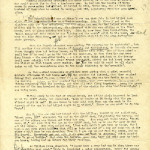
The Funeral. unknow_funeral_notes_003.jpg
TRANSCRIPTION – The Funeral
Funeral occasions sometimes had their drama, as in the case of John S. One would search far to find a handsomer man. He had won the hearts of three women in succession; had killed, or helped to kill, three men, one of them the husband of Mary whom he wanted to marry — and did — separating from her soon after.
The funeralizing of one of these three men that John S. had killed took place at the log schoolhouse on a Sunday morning. John S. himself sat on the platform with the five preachers, and the other two men who had helped with the killing sat in the congregation. His divorced wife, who was sitting on the front bench, went to sleep holding her baby. John S. came down from the platform, the ‘Sweet Songster’ from which was ‘lining out the words’ still in his hand, and took the baby from Mary and sat on the platform with it in his arms during the whole service.
When the fourth preacher rose saying,
My remarks may be scatterin’, but I’ll confine them within the bounds of Genesis and Revelations, my friends who were there thought they had better leave, as it looked like rain. One of them asked a small boy if he would go to the top of the mountain, to show them the way over Sang Branch — the moonshine trail, — so that they might get down on the Greasy trail more quickly; but the other friend protested, saying she had heard some one was killed on that branch every Sunday. The boy said it would be all right today as all the moonshiners were in the house listening to the preachin’!
As they walked homewards my friend kept saying what a quiet peaceful Sabbath afternoon it had been. The weather had cleared, when they reached Greasy they stopped to make a long call on Aunt Su, who was too feeble to go to the meeting. Later, as they reached Big Laurel, they were overtaken by a group of riders returning from the meeting, and they all went along together. Among the group was one of the men involved in the killing of the victim for whom the funeralizin’ was being held.
Riding along in the bed of Greasy Creek, one of the girls happened to look up at the cliff above, and exclaimed, “Look up yonder at Si Craig with his gun p’inted right to us!” Si was known to have said that, “Any man who went to the funeral of the man he had killed ought to be killed.” There he was ready to do his ‘duty’.
Sam K., the man who had helped with the killing, looked up and called out, “Shoot away, Si!” whereupon the man on the cliff shot, frightening the horses, and one of the riders was thrown and broke her arm. Sam sang out, “Just wait until I get into my house, for I have a gun with steel bullets that will go into one end of a log and come out at the other end.” Soon he was shooting. Then it began all up and down the creek, and up Big Laurel. Everybody got out with their guns and ‘went shooting,’ which sounded like ‘a great battle.’ But when the bullets gave out, they all rode away to their own homes, having had an outlet for their feelings.
But, as William Blake observed, “I never knew a very bad man in whom there was not something very good.” John S. developed a quick consumption. Never did anyone meet his fate more bravely. A few days before his death he had dragged his mattress to the door sill, and was lying there in the sun as I passed by. Drawing up Billy, I stopped for a few words. He said he was “feelin’ fine.” When I think of John S. it is of his brave spirit, and not of his wayward ways.
III. A Mountain Funeralizing
This third re-counting of a mountain ‘funeralizing’ is a 15-page description of a Primitive Baptist “funeralizing” conducted by the Rev. Fred Talley for three young men killed in the Pine Mountain valley. The three, shot in three separate incidents, were John Drum, Peter Hadley, and James Drum. The funeralizing was held in the County Fork Schoolhouse, Sunday, September 23, 1928, one year out from the deaths of the three young men.
GALLERY III: A Mountain Funeralizing
- A Mountain Funeralizing unknow_funeralizing_001.jpg
- A Mountain Funeralizing unknow_funeralizing_002.jpg
- A Mountain Funeralizing unknow_funeralizing_003.jpg
- A Mountain Funeralizing unknow_funeralizing_004.jpg
- A Mountain Funeralizing unknow_funeralizing_005.jpg
- A Mountain Funeralizing unknow_funeralizing_006.jpg
- A Mountain Funeralizing unknow_funeralizing_007.jpg
- A Mountain Funeralizing unknow_funeralizing_008.jpg
- A Mountain Funeralizing unknow_funeralizing_009.jpg
- A Mountain Funeralizing unknow_funeralizing_015.jpg
- A Mountain Funeralizing unknow_funeralizing_010.jpg
- A Mountain Funeralizing unknow_funeralizing_011.jpg
- A Mountain Funeralizing unknow_funeralizing_012.jpg
- A Mountain Funeralizing unknow_funeralizing_013.jpg
- A Mountain Funeralizing unknow_funeralizing_014.jpg
A Mountain Funeralizing, 1928
“Funeralizing” or memorial services of the sort described on these pages no longer are to be found in the regions.Their good means of communication make for the nobility of highland peoples. The actual ceremony here depicted was held in the County Fork Schoolhouse on Sunday, September 25, 1928, in memory of three young men killed within the preceding three years. John Brum, Peter Hadley and James Drum, respectively son, son-in-law and nephew of Silas Drum were killed under circumstances whose chief element was moonshine liquor. One death occurred at an ‘”Infare” or wedding festivity to which the slayer had come in a drunken, quarrelsome humor about his wife whose behavior at the celebration did not please him. He shot Into the crowd killing one cousin, wounding an uncle and another cousin. Not long after this incident, while “toting” liquor over the mountain in a party of several men, Stanley Drum, in a drunken brawl, boasted that he could shoot a man “without lookin’ at him.” A moment later his cousin lay dead with a bullet through the heart. The third dead man had been on a moonshine orgy at a neighbor’s just before his body was found in the road, his head badly crushed, and his mule grazing nearby. Whether he had been kicked by the mule or struck on the head with a heavy instrument was never determined but local suspicion pointed to foul play. The funeralizing had been delayed these two years in order to allow the bitterness and possibility of revenge, to subside.
TRANSCRIPTION – [page 001]
A MOUNTAIN FUNERALIZING
The service is under the direction of Fred Talley, Primitive Baptist preacher about fifty years of age, whose daily occupation is that of carpenter and painter in the nearest town twelve miles away over the mountain. Saturdays and Sundays he gives to preaching. He had come on Saturday to County Fork to hold the first part of the ‘funeralizing’. (1.) The Saturday gathering differs in no essential way from the [page 002] Sunday meeting, except that following the latter the company goes to the hill-top grave yard for further prayer and singing lament. This particular type of Baptist group excludes musical instruments in its meeting; does not believe in Sunday School; its preachers proudly assert that they prepare no sermons “but depend on the spontaneous inspiration of the occasion, hot coals from off the altar”; they stress a golden-paved heaven and a “burning fiery hell” with more emphasis on the latter than on the former; and they “believe in the literal cover-to-cover interpretation of the Bible, swearing by the King James version and eschewing the latter versions such as the American revised. The preacher asks and seeks no remuneration “but with some reluctance accepts whatever donation is proffered” in spite of his protests.
In this valley, as in other remote sections of the mountains, the schoolhouse is the place of assembly. Church buildings are seldom found.
The County Fork school is located on firm bottom land well grassed and with groves of trees near by. From the road, two hundred feet away, the school grounds are reached by a swinging foot bridge across a shallow stony creek. The building is a small, L-shaped affair of one room, with six [page 003] windows, a narrow door, a slightly raised platform on which a table is located, a centrally situated stove, and desks and chairs of various sizes to accommodate about twenty pupils. At the customary height for blackboards the ceiling-board walls are painted black. Of the three windows on the long side of the building, the one nearest the platform lacks one-quarter of its full equipment of glass.
The day is fair and warm, Many in attendance had expected the meeting to be held out-of-doors but the preacher had decided otherwise. Shortly before 11.00 A.M. when the
gloomy singing begins, some fifty men, women, children and infants have crowded into all available space, some sitting on desks, others on benches, a few others on chairs, some on
the edge of the raised platform, and still others standing in aisles, corners and the doorway. Infants are nursing on the heaving bosoms of their mothers. Young people are present
in their finest array. Children wear shoes and stockings. Outside, groups of two and three, mostly men, are scattered here and there, some loitering on the bridge, others on the
bank above the road, and still others staying near enough to the schoolhouse to hear the strong voiced preacher.
No instrument accompanies the mournful singing. Line by line the preacher in rapidly spoken words “lines-out” the hymns. The singing itself is that common to the remote mountain regions, a weird lament in the minor mode, with slurring as the prominent characteristic. Hymn and song present little variation in music or in theme, — a monotony of [page 004] somber, melancholy dwelling on death and destruction. (2.) No note of joy or brightness is observable in voice or face.
The preacher’s manner is one of utmost informality. He sits on the table, his back to the bulk of the congregation as he reads and sings by the light of the window. He relieves his nose, throat and mouth with crude abandon,
The singing ended, the preacher clears his throat and expectorates on the floor. Glancing around he notices the lacking window pane. The room is already steaming and malodorous. He takes his ample jackknife and, while he inserts the opened blade between the upper and lower sashes [so] that his coat may cover the aperture by hanging on the upward extending knife handle, he remarks: “I got an awful cold an’ cain’t rist [risk] nary a draft on me today. Fresh air is thus effectually excluded from that quarter. “You folks standin’ back thar, cain’t ye find room to set down up here; cain’t some of ye git some moh cheers [chairs].” The door remains open that those who stand there may see and hear.
The preacher, having satisfied himself that his audience is in a tolerably comfortable and receptive mood, sets forth on his discourse, beginning in what may be termed a normal delivery, both as to voice and gesture. His speech accelerates as he proceeds. The sermon is marked by superfluous repetition, by emphases, loud shouted exclamations, and [page 005] gestures which bear little or no relation to the content of his remarks. The following report (3.) by no means contains all the torrent of words which, at the height of their flow, are spoken at the rate of 250 to 300 per minute, but it does give verbatim utterances and the general sequence of the preaching. Much of the repetition is omitted. The capitalized words indicate shouting, sometimes screaming, in which the voice occasionally breaks, in a vigorous sforzando. No text is announced for the service.
The Sermon
My very respectable friends, it’s a mighty sad occasion that has brought us together this mornin’. I want you to go aprayin’ that there will be something said or done today that will mean the savin’ of some soul before they die. If your soul has been purified by the blood of the Lord Jesus Christ, you’re saved. Death has brought us here this mornin’. Now don’t forget this mornin, everyone of you to pray. …. Some begged me not to come here today. (4.)
The same Jesus that went down into the bottom of the ocean with Jonah is alive today. That ocean couldn’t hold him. (Voice louder and speech more rapid) Remember when he was alayin’ thar asleep on the piller? He is not asleep today but thar He was. They, the desciples couldn’t control that thar ocean,—they got skeered. They kneeled down, they did, an’ prayed! I wish that somebody would get so excited today before they leave that they would get down on their knees and call to God. They knelt DOWN and cried to Jesus! Don’t you believe that Jesus can quiet this neighborhood? Thar’s not enough prayin’. THAT’S what’s wrong! OH, ye of little faith. THAT man can control. DON’T lose confidence in Jesus.
[page 006] He’s the one that can save. (With tremulous voice) Some of the boys are up thar on the hill, asleep, now. I know asomthin’ about what it means. Four years ago the death angel come and took my boy. You’re lonesome, you mothers and fathers an’ kinfolk.
You may have heard a great deal said about Fred Galley. (Rapid speaking) Thar-was-a-time-way-back-thar-when-I-kneeled-down-in-the-road-and-was-saved. WHAT-has held-me-up-all-these-years,-that-same-Jesus OH, I–was~saved-from-hell.
God bless your soul, I love you all because of the love of God. Don’t you get in your mind that there’s no such thing as a hell. Death comes like sudden destruction, like lightning from the sky. There’s not but two places, Heaven an’ Hell* (spit) Three, four, five years ago they was here, but they are not here today. Just read what struck Florida, Sunday. YES, God bless you, you cain’t get away from that lonesome tomb. As death finds you, so will the Judgment (spit).
At this point an old automobile rattles its way up over the stony creek bed to deliver eight or ten chairs, thus causing a slight interruption of the services.
If you don’t repent of your sins you’re goin’ to hell because Jesus sent me to preach the gospel, an’ I’ve been doin’ it for twenty-three years. The devil cain’t stop me. Did you ever try to beat the devil? You just obey the commandments of God an’ you can beat the devil.
He calls for a glass of water, complaining of dry throat.
That soul dwells in the body, and is eternal. What sends people to hell? Doin’ right?…How oftimes did that light shine in your heart I… I love you this mornin’ every one of you and you know the reason why I come this mornin’,—it is because the love of God is shed abroad in my heart.
If you don’t pray any this mornin’ you will at the resurrection mornin’. If you was all given a nice home down the creek, EVERYBODY would go down thar and get it but it don’t last long. Everybody will live about fifty years. That’s not one moment of time compared with eternity. The soul has lived in the body, and it is living. There’s a home in heaven and if you miss that home you are goin’ down whar your father, your mother, your sister, your brother don’t want to come. GREAT GOD, you don’t want nobody thar. THAT’S the devil’s plan. (Clears throats and spits beneath table) OH, I’m acquainted with the devil an’ just thirty-one years ago I got away from him. How the devil is acomin’ again, come in sheep’s clothin’. WHY can’t he come back in control? Because thar comes a stronger man. Now don’t you get it in your mind that you ain’t a-goin’ to die.
Some of you have homes whar love has a chance. Some of you come from homes whar cussin’ goes on from mornin’ till night. Ain’t that a sight on earth? Take love out of a home and what becomes of that home? You just study just a minute how merciful God is. Some folks spend a lot of time damning the children, –asking God to damn them. Why not ask God (spit) to bless somethin’? GREAT GOD, do you believe it is right to cuss before your child? The first thing you ought to do is to quit cussin’ before your child….. But GREAT GOD, lay ’em down…. A child, the very image of an angel. GREAT GOD ALIVE you have got to give an account. Time will come when every knee shall bow.
Thar was one man one time and he was an honest man, He heard a voice sayin’, ‘CALL on God to have mercy on that soul of your’n.’ An’ Paul said, ‘What do ye want, Lord,’ ‘Arise, arise’, and Paul did, and he never eat nary a thing for three days. I wish to GOD today that they would get so much religion that their victuals would not taste good to them.
A small baby sets up lusty crying but this seems to disturb no-one. Individuals pass in and out quietly from time to time.
You that hain’t had death in your home, when you do lose one, that one looks like the most precious jewel.
I want to ask you a question. Is it the man of God that stands and prays this mornin’? No, he’ll kneel. Someone says ‘Let’s bow’. NO, say I, let’s get down on our knees,—every knee shall bow. I’m with you because the love of God is shed abroad in my heart. Listen, I will never meet you all any more, all of you that’s here this mornin’. (spit) Sure I’m comin’ back again and when I come back again some of [page 008] you will be gone. Listen, young men, to what Jesus said OH, I fear for them dying unsaved.
Here the preacher lines out a hymn which is sung in a wailing, tearful manner. “Farewell my dear brother, we need not wait but a few more days and He will call us home.” The preacher, during the singing, passes in and out among the company, shaking hands with all. At the conclusion of the hymn, all kneel and the preacher prays in a tremulous, plaintive tone.
The Prayer
Oh how can we approach thee. We want to say that we cannot pray a prayer. (Spit) Oh, I want to thank you. You know for what purpose I left that sick wife yesterday mornin’. Take charge of my mind and my body this mornin’ so that it will go the way you
want it. My mother is up thar; my father, Sis, up thar because you showed it to me. I want you to bless every one of these brothers and sisters (spit) who have washed their robes in the blood of the lamb, We want to thank you.
At this point the prayer is approaching a frenzy of emotion, the words pouring forth with astonishing rapidity, the preacher’s body swaying backward and forward in rhythm
with his utterances now coming in sing-song cadences.
You-have-told-us-that-if // we-would-make-our-wants-known // you’ll-satisfy-them // Oh-Lord // I-thank thee-Oh-Lord // that-I-never-saw-a-quieter-congregation-Lord // than-I-have-had-this-mornin’ // 0H-Lord-we-believe-this-mornin’ // We-have-come~in-your-name // We-want-to-thank-you-this-mornin’ // for-every-brother-and-sister-Lord ……
Emotional fervor is reaching its zenith and a woman on the preacher’s right begins shouting and screaming: “Oh save me, save me, save them…..” She claps her hands and pounds the desk at which she is seated, all the while screaming incoherently as she rocks from side to side. “My three children [page 009] is agoin’ down, DOWN TO HELL, OH, JESUS.”
Two small children laugh. A baby cries. Vocal tumult reigns. The woman’s words again are momentarily understandable as her sobbing screams surmount the uproar: “OH, I hope they’ll be THERE.” (6.)
The preacher goes on undismayed by the pandemonium, his body swaying rhythmically, indistinguishable utterances pouring forth, his right forefinger and thumb frequently snap-ping the mucous from his nose, his body occasionally pausing in its oscillations that he may accomplish more perfect expectoration. His sing-song petitioning emerges:
Oh, John Drum-a-a-a-h // one-a-mornin’ -said-to¬me // that-he-wasn’t-the-man-he-ought-to-be // OH GOD- a- a- a- a- a-h
Toward the end of this twenty-minute period of undulating prayer, the preacher gives evidence of fatigue; his speech is less rapid; his enunciation becomes drawling, attenuated, as just indicated in his remark about John Drum, perspiration streams from his face; finally his voice modulates to more natural rise and fall with his closing words:
I feel well paid for a-comin’ to this place already. When I work for Jesus I get my pay now.
He arises, gives his shirtsleeves a hitch upward, folds his handkerchief to match its corners, a mannerism in which he indulges often especially during the singing.
[page 010]
The Sermon Resumed
Now we want to please everybody this mornin’ if the truth pleases. I reckon some of you remember the story of Lazarus, how when the Lord come the women folks took Him down thar to the tomb an’ how the Lord was told he better not go in thar because the body was a-stinkin’ hit had been buried so long. But the Lord give heed to nary a one of them. He
went right down into that thar tomb and told Lazarus to come forth.
Now I hain’t never made no preparation for my preachin’,–the prepared sort of preachin’ don’t amount to nothin’. No. The Lord takes care o’ that, for the love Of God is shed abroad in my heart.
Now let’s have the obituary.
The names of the two deceased, their birth year, “killed”, giving the date. It happens that one man was killed September 23, 1926, exactly two years before.
He’s dead, the breath has left the body but the soul is alive. At the sound of the first trumpet he’ll appear. Them that remains on earth will not hinder them that sleeps. That’s what the King James translation says. These late years we been ahearin’ a lot about other translations, but the King James is the true translation. Take that thar American Revised translation, hit’s just as corrupt, just as rotten as hit can be. Them later translators have got the very things to suit their own taste. What is the matter with them? They revised it in 1988 an’ now they revise it again to suit the devil. How King James had 72 men git to work at revisin’. THAT’S the way, 72 of them sent out. By two by two to translate. An’ they all come back and what do you suppose the difference was? Just two words different. That Bible will tell you them things. (Spit) One of my neighbors brought me the American Revised translation sayin’ that he didn’t [page 011] like it. I told him, I didn’t neither.
Now if the great God of heaven will help me I will preach to you today. ‘He that believeth on me shall never die’. Lazarus had been dead. But he rose again when the Lord come. After these services I want everybody to go down to the grave with me and we shall sing and pray there. God bless your soul have been agoin’…. I go to my boy’s grave two or three times a year, put flowers thar, but we cain’t do the dead no good by comin’ here. GREAT
GOD ALIVE now listen here, GREAT GOD have mercy on them.
An automobile was acomin’ down the road. Hit got too close to the edge, went off and rolled down the bank, an’ GREAT GOD I expected they’d all be dead when I got there. As I ran down I heard a woman’s voice raised in prayer for mercy, and when I got thar, praise God they wasn’t hurt.
GREAT GOD look at what God can do. When my boy was taken,……YES, an’ I kneeled right down and the burden never has been so heav.y Jesus was the burden bearer when Marthy and Mary sent for Him. He come didn’t He? (Spit)
I want to speak to the Christian men and women this mornin’. Are you ahelpin’ Jesus? Well, perhaps someone says ‘I reckin I am’. But GREAT GOD listen, it is not for my sake that I come over here but to show you that there is a heaven and a hell like Jesus says, not for my sake alone but for others. GREAT GOD when they rolled away the stone what happened. Now sister you know when you hear the gospel preached it reaches right down in your ear, (spit) don’t it?
Someone told me the other day that they enjoyed my sermon but that I talked too fast, but GREAT GOD I cain’t help it, – when I’m full of the love of God. GREAT GOD ‘Lazarus come forth’*. Hit is your duty to preach the gospel and to send men into the world to preach the gospel. If they would come together (spit).. ….God bless you today I love you today, you’re payin’ such good attention. I may preach a right smart while today.
He takes off vest, then bends over and snaps the mucous from his nose.
Some of you remember old John Fox-well-a-he-was on his death bed an’ wanted to confess his sins. John had been a cruel man an’ when I leaned over to hear [page 012] what he had to say he asked me if I reckon he’d ever get shut of his cruelty in dehornin’ cattle… GREAT GOD, he said he never knowed a sinner could worship God.
The preacher is now thoroughly warmed up to his duty of the morning. The words come with unabated speed in a singsong manner before mentioned.
A-woman-came-with-a-box-of-ointment (spit) an-wiped his-feet-with-the-hair-of-her-head. GREAT GOD they-haint-got-it-today. GREAT GOD listen-to-what-he said THERE’S what will make a good husband, wife, son, …
Here the preacher seems to render a ballad on the foot-washing incident, and as he sings a young man on horseback rides by rapidly on the road firing several shots from his revolver as he goes.
The preacher with vehement gesture and torrential verbiage holds sway over the sober-faced group. He refers to legions of devils and the talkativeness of the devil. On one
occasion he met an atheist at a funeral. “I-started-on-him, got-to-feelin’ -good-and-he-got-mad-and-never-said-another-word-to-me. He-knew-I-was right.” He mentions Drum’s mother “agrievin’-so-last-night-that-I-could-hardly-eat.”
Physical weariness is overtaking the preacher. The sentences come with labored breathing. Both arms are flung wide in poorly coordinated gestures. He paces back and forth on the eight-foot stretch of platform. Because of fatigue, one word slides into another with a trailing “a” connection.
An-aaaaa-one-night-the-death-angel-come-aaaaa and-took-him-away.
[page 013] A razor-back hog grunts his way from beneath the building. A baby sleeps in the mother’s lap as she sits with solemn countenance beneath the preacher’s spell. A male mourner with downcast eyes dwells in stolid contemplation. Children are quiet. Young people no longer smile covertly at each other. Awesome silence is in command with the swish of breeze and brook the only intrusion. The Preacher thunders forth.
Boys-and-girls-a-stay-out-a-bad-company-or-you’ll go-down-into-hell. FOR GOD SAKE lay-down-on-this drinkin’-rotten-liquor; lay-down-on-this-a-cursin’; stop-for-GOD~SAKE-this-a-growin’-gray-hairs-in-your-mother’s-heads.
He pauses and rests; wipes his face with the wet, gray handkerchief, and in a little quieter, more deliberate manner resumes:
Thar’s-a-home-over-on-the-hill, Russell’s-home. I don’t-see-much-to-comfort-them-little-children-thar. Thar’s-Smith-with-aplenty-, -nothin’ -to-worry-him. But-that-other-isolated-home. FOR-GOD-SAKE-don’t-let-the~little-children-suffer-. ‘I-was-hungry-,-thirsty,-naked,-in-prison’—and-ye-helped-me. THAT’S-what-Jesus-said-about-them-that’s-a-goin’- to-heaven-
I’m-goin’-to-have-to-quit-directly.
He pauses and rests again.
Though ye were dead yet shall ye live. (Spits and blows nose) Sinners I want to say one thing to you today.
He then refers to Paul and Felix, “that old man Felix.”
They’s men who say they cannot pray, hit’s because they are disobedient …I love to preach today. They tried to keep me from comin’ today. My daughter has a drunken husband, an’ she has an awful time sometimes, but now when he comes home drunk she treats him kind and it works a lot better. FOR GOD SAKE lay down that tomfoolery.
[page 014] People come and go quietly. Some of the men have the odor of liquor about them.
Somebody said to me that they didn’t like shoutin’ in this world. — Well if you don’t like it in this world, they’ll be right smart shoutin’ in heaven.
I ain’t agoin’ to preach all day long. Farewell, read your Bibles and pray. Be led by the spirit of God and live for one another.
It is now one o’clock. Preaching and praying, with a small amount of singing, have occupied two hours.
Now while this song goes on if anyone wants to join with us, come on. I hope I will give satisfaction today.
The congregation sings and while thus engaged the preacher invites: “Anyone wants to unite with us, come on.” He smooths his handkerchief and matches its corners on the table, as he sings. “I hope to see some of the people confess. Let your light shine before the world! Let everybody shake hands.” They move in and out among each other, singing that they are going home to die no more, tears streaming down many faces. “Boys and girls, if you have any flowers to give your mothers give them to her while she is alive, for God’s sake.” His voice has resumed its natural tone.
The old mother of one of the murdered men wails again and again “Blessed Lord” as she circulates through the throng, varying her expression of grief with the petition, “Have mercy on me.”
The young horseman rides by again and four shots ring out. The preacher bids all be calm.
The singing ends. A brother of the deceased announces: “I have a little grain of money to start a collection for [page 015] the preacher,—any of you that wants kin add to it.”
Now I didn’t come for that (the preacher interjects). Don’t feel you got to give me a thing. This has been a wonderful congregation I’ve had today. Now let’s all go up to the graves.
The schoolhouse is soon emptied. Along road and creek bed the congregation scatters, some on foot, others on horses or mules. In twenty minutes most of the company have assembled on a treeless knob-like hill, where the well-drained summit affords a fenced off burial ground and according to some, a better chance at the resurrection morning. Some two dozen bodies have been interred there, many of them with stones at the foot as well as the head of the six-foot mound of earth which the crude coffin has displaced. The preacher and the bereaved parents arrive. The old mother half sits, half lies, on the bare earth at the head of the grave, as the preacher lines out the hymn to be sung. The singing ended, all kneel for ten minutes of prayer which is marked by more calmness and coherence than obtained in the service proper. At the close of the prayer all stand and sing again. A short benedictory prayer closes the funeralizing.
(1.) “Funeralizing” or memorial services of the sort described on these pages no longer are to be found in the regions. Their good means of communications make for the nobility of highland peoples. The actual ceremony here depicted was held in the County Fork [?] schoolhouse on Sunday, September 25, 1928, in memory of three young men killed within the preceding three years. John Brum, Peter Hadley and James Drum, respectively son, son-in-law and nephew, Silas Drum, were killed under circumstances whose chief element was moonshine liquor. One death occurred at an ‘”Infare” or wedding festivity to which the slayer had come in a drunken, quarrelsome humor about his wife whose behavior at the celebration did not please him. He shot Into the crowd killing one cousin, wounding an uncle and another cousin. Not long after this incident, while “toting” liquor over the mountain in a party of several men, Stanley Drum, in a drunken brawl, boasted that he could shoot a man “without lookin’ at him.” A moment later his cousin lay dead with a bullet through the heart. The third dead man had been on a moonshine orgy at a neighbor’s just before his body was found in the road, his head badly crushed, and his mule grazing nearby. Whether he had been kicked by the mule or struck on the head with a heavy instrument was never determined but local suspicion pointed to foul play. The funeralising had been delayed these two years in order to allow the bitterness and possibility of revenge, to subside.
(2.) See “Young People Who Delights in Sin”, the Gillin family. (infra p. ).
(3.) Recorded in shorthand.
(4.) He did not make clear whether his advisers feared a “shottin’ [shootin’ ?] affair” or whether they were merely solicitous about his cold. It would appear from remarks made during the preaching that their anxiety referred to possible violence, not toward him, but between the kinfolk involved in the tragedies.
(5.) [1] This woman, when called upon the following day, wore a bandage around her head, to relieve her “splittin’ headache” She had slept “nary a bit last night an’ couldn’t do nothin’ but set around all day.” She gave no hint that emotional excess had had any causal relation to her present discomfort.
(6.) One of those in whose memory the service is held.
(7.) This date is doubtless a word-slip. These preachers are often extremely inaccurate in spite of great aptitude in quoting scripture. H.B. reference early in this sermon to Jesus and the bottom of the ocean.
See an earlier account of a “Funeralizing” by PMSS worker Celia Cathcart, “A Funeralizing on Robbers Creek,“ which was published in the Outlook, April 13, 1921, p. 588.
See also the Survey Graphic magazine account of August 1946 of a “Funeralizing ” attended by Percy and Marion Morse MacKaye when they visited Pine Mountain in 1921 and later wrote about the event that took place near the Line Fork Settlement a short distance from the School.
Return To:
RELIGION Guide

